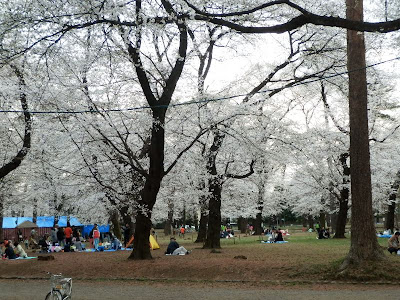Cherry Blossoms in Tokyo Area, Japan
TPP
One of the biggest issues in the Japanese politics now is the so-called TPP.
The 2005 Trans-Pacific Strategic Economic Partnership Agreement (TPSEP or P4) is a free trade agreement among Brunei, Chile, New Zealand, and Singapore. It aims to further liberalize the economies of the Asia-Pacific region.
Since 2010, negotiations have been taking place for the Trans-Pacific Partnership (TPP), a proposal for a significantly expanded version of TPSEP. The TPP is a proposed free trade agreement under negotiation by (as of December 2012) Australia, Brunei, Chile, Canada, Malaysia, Mexico, New Zealand, Peru, Singapore, the United States, and Vietnam.[9] Japan has expressed its desire to become a negotiating partner,[10] but not yet joined negotiations as the TPP became a major issue in Japan's 2012 election.
Anti-globalization advocates accuse the TPP of going far beyond the realm of tariff reduction and trade promotion, granting unprecedented power to corporations and infringing upon consumer, labor, and environmental interests.
One widely republished article claims the TPP is "a wish list of the 1%" and that "of the 26 chapters under negotiation, only a few have to do directly with trade. The other chapters enshrine new rights and privileges for major corporations while weakening the power of nation states to oppose them."
http://en.wikipedia.org/wiki/Trans-Pacific_Strategic_Economic_Partnership
So, it is another form of embodiment of Wall-Street greed.
Though many big American corporations are joining their efforts to make the US Government pursue prevalence of this TPP regime around the Pacific Ocean, some US industry is against it.
"This new trade agreement will place domestic U.S. firms that do not do business overseas at a competitive disadvantage. Foreign firms under this trade pact could conceivably appeal federal regulatory and court rulings against them to an international tribunal with the apparent authority to overrule our sovereignty. If foreign companies want to do business in America, they should have to follow the same rules as everyone else. Obama is negotiating a trade pact that would constitute a judicial authority higher than even the U.S. Supreme Court that could overrule federal court rulings applying U.S. law to foreign companies. That is unconstitutional. The U.S. cannot be allowed to enter a treaty that would abrogate our Constitution."http://act.americanjobsalliance.com/issue/tpp-threatens-american-jobs-freedoms/
– Bill Wilson, President, Americans for Limited Government
But some countries also are anxious about an influence of Japan's expected joining of TPP.
Terms of Japan's entry to TPPA talks bad news for NZ, 'surrender of sovereignty' for Japan
'Japan’s Prime Minister Abe will announce this afternoon that Japan will seek to join the Trans-Pacific Partnership agreement (TPPA) negotiations. He already has US endorsement to do so', says Professor Jane Kelsey who has just returned from observing the Singapore round of the talks.
Once a 90-day notification period to the US Congress expired Japan would be able to join the talks in September, one month before the political leaders of the existing eleven countries hope to sign the completed deal.
'If this is true, the US has effected a double play on New Zealand', said Professor Kelsey.
Trade Minister Groser said New Zealand would welcome Japan's participation 'once we have established procedures for their entry that are acceptable to their governments and to ours'. That was widely taken to mean Japan’s agreement to comprehensive agricultural liberalisation in line with the statement of the TPPA leaders in Honolulu in November 2011.
Australia has been trying unsuccessfully to achieve that goal in a free trade negotiation with Japan since 2007.
New Zealand would have just over three months to get Japan to agree or give way to a timeframe that appears to have been imposed unilaterally by the US.
'Even if Japan agrees in principle to consider opening dairy market access, that is just the first step in the process', according to Professor Kelsey.
'Assuming the US continues to delay any substantial discussion of dairy market access to its own markets until September, the US and Japan could then join forces in demanding flexibility and stymie the one gain that New Zealand government has said is a bottom line and without which it will walk away from the TPPA'.
http://www.itsourfuture.org.nz/terms-of-japans-entry-to-tppa-talks-bad-news-for-nz/
So, TPP might make every party unhappy except Mr. Obama.
It should be abolished.
*** *** *** ***
Mar 3:24 And if a kingdom be divided against itself, that kingdom cannot stand.
Mar 3:25 And if a house be divided against itself, that house cannot stand.
Mar 3:26 And if Satan rise up against himself, and be divided, he cannot stand, but hath an end.
Mar 3:27 No man can enter into a strong man's house, and spoil his goods, except he will first bind the strong man; and then he will spoil his house.

